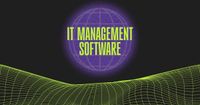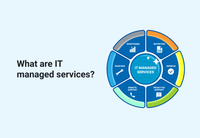Explore web search results related to this domain and discover relevant information.
The WGU IT management bachelor’s degree is a valuable, affordable, at home, and accelerated online program for working business and information technology professionals.
Small or large, public or private, nonprofit or for-profit, every business and industry needs technology to help it thrive. Earning an online technology management degree will prepare you to meet the needs of businesses, helping them to overcome software delays and system failures and dramatically impacting their bottom line.WGU’s online business information technology management degree program includes coursework in key areas like management and leadership, business, networks and security, and information systems management. These information and technology skills will be vital in helping you mesh important business and IT strategies to help organizations thoughtfully utilize technology.You'll stand out from the competition with knowledge in business and IT areas that will make you a valuable asset to any team. This information technology management bachelor’s degree program will prepare you for career success in information technology management roles that are vital in every industry.The second part gives an introductory-level look at the specialized areas of operations management, supply chains, and logistics. The course finishes with models of change management and how to use them to overcome barriers in organizations. ... This course provides students with an introductory look at the discipline of finance and its context within the business environment.


IT management requires both technical skills and the ability to lead teams, projects, and processes. These 20 certs will help you hone and showcase your IT management bona fides.
The certifications you’ll want to pursue will vary depending on the technologies you work with and the methodologies your organization employs. But whether you’re on the management track or have your eye on an IT management career, any one of these 20 IT management certifications should help give you a leg up in the industry.The AMA Certified Professional in Management isn’t an IT-specific certification, but it’s a great start for anyone interested in a management path. As an IT manager, you’ll need all the technical skills of an IT professional, but it’s also important to have the soft skills necessary for effective management.The certification is offered through the American Management Association and covers professional effectiveness, relationship management, business acumen, and analytical intelligence. Exam fee: $450 plus a $50 application processing fee ... As an IT manager, you’ll be responsible for overseeing multiple IT projects during your career.The CAPM certification from the Project Management Institute (PMI) will demonstrate your ability to manage a product or service lifecycle. The CAPM is a generalized entry-level exam, so it’s a great place to start if you’re looking to add project management skills to your resume to help pave a future in IT management.

Learn what IT management is, why it's important for organizations to implement the process and what skills can help you succeed in this career.
Whether organizations have traditional or cloud infrastructure, most rely on technology to perform everyday tasks. This reliance emphasizes the importance of IT management, which is the process of maintaining an organization's computer-based activities. Implementing IT management can help an organization increase productivity and protect sensitive data.IT management, or information technology management, is the process of overseeing an organization's computer-based activities. One key component of IT management is determining the organization's operational requirements and sourcing the appropriate hardware and software.IT management ensures that employees have the necessary resources to perform their duties. For instance, they might provide technical support to help employees quickly resolve network issues. IT management teams also implement automation tools to reduce unnecessary workloads and inspire innovation.Some organizations hesitate to implement IT management because of the cost of employing extra staff, but the expense is often worth it. IT management can decrease costs by finding the most affordable equipment from vendors without sacrificing safety and productivity.

Discover the top IT management software and find the best option for your team. Compare features, pros & cons, prices, and more in my complete guide.
NinjaOne is a top-rated UEM and IT management software that offers a range of solutions for IT departments and MSPs, including endpoint management, patch management, mobile device management, remote control, and endpoint backup.Why I Picked NinjaOne: When comparing various tools, NinjaOne stands out due to its comprehensive suite of features that cater to both IT departments and managed service providers (MSPs). The software provides robust tools to monitor, manage, and secure endpoints at scale.Integrations include ConnectWise Manage, Autotask PSA, HaloPSA, Accelo, SherpaDesk, RepairShopr, Harmony PSA, Bitdefender, CrowdStrike, SentinelOne, ConnectWise ScreenConnect, Splashtop, and TeamViewer. ... NinjaOne has acquired Dropsuite to enhance its backup and data protection services for cloud applications.It offers a suite of tools that aim to simplify the complex tasks associated with IT management. Why I Picked Atera: I chose Atera because of its remote monitoring and management capabilities. This feature lets you keep an eye on all your devices in real-time, which is helpful for maintaining system health and preventing potential issues.
IT Management is different from management information systems. The latter refers to management methods tied to the automation or support of human decision making. IT Management refers to IT related management activities in organizations.
Managing the responsibility within a company entails many of the basic management functions, like budgeting, staffing, change management, and organizing and controlling, along with other aspects that are unique to technology, like software design, network planning, tech support etc. The central aim of IT management is to generate value through the use of technology.IT Management is different from management information systems. The latter refers to management methods tied to the automation or support of human decision making. IT Management refers to IT related management activities in organizations.The efficiencies of having this type of integrated and automated management environment allows enterprises to get their applications up and running faster, with simpler manageability and maintenance, and enables IT to adjust IT resources (such as servers, storage and networking) quicker to meet unpredictable business demand.IT managers have a lot in common with project managers but their main difference is one of focus: an IT manager is responsible and accountable for an ongoing program of IT services while the project manager's responsibility and accountability are both limited to a project with a clear start and end date.Most IT management programs are designed to educate and develop managers who can effectively manage the planning, design, selection, implementation, use, and administration of emerging and converging information and communications technologies.

As technology becomes increasingly essential to business growth, companies look for ways to incorporate IT services into overall needs. ITSM helps businesses build structure around the lifecycle of those IT services, from ideation and creation, to management and upkeep.
ITSM encompasses multiple IT management frameworks that can apply to centralized and decentralized systems. There are multiple frameworks that fall under the ITSM discipline, and some address unique industry-specific IT needs, including those in healthcare, government, or technology.They’re designed as a guide to bring organization and structure to service-oriented IT departments, aligning IT goals with business needs and goals, especially for customer-focused companies. If your company has already embraced change management, you’re on the path to building an ITSM environment based on improvement and growth in processes, services, products, and software.IT as a service is heavily emphasized in the ITIL v3 and updated ITIL 4 frameworks, and as such, it’s tightly woven into the foundation of ITSM. So it’s less about ITSM vs. ITIL and more about how ITIL supports ITSM and allows businesses to embrace and implement streamlined service management.ITIL views service desks as a Single Point of Contact (SPOC), which can streamline communication within an organization or business unit. Service desks act as hubs for users and customers to contact well-trained staff to manage issues in an organized and coordinated manner.
The Zacks Computers – IT Services industry comprises companies that provide consultancy, communications software and services, IT management and operations, cloud-based web development platform, customer relationship management, professional information solutions, real estate information ...
The Zacks Computers – IT Services industry comprises companies that provide consultancy, communications software and services, IT management and operations, cloud-based web development platform, customer relationship management, professional information solutions, real estate information and analysis, and outsourcing services.The Zacks Computers - IT Services Industry participants like INFY, CTSH and TBLA are benefiting from ongoing digitization, strong demand for hybrid working solutions and improving IT spending.The Zacks Computers – IT Services industry participants like Infosys INFY, Cognizant Technology Solutions CTSH and Taboola.com TBLA have been benefiting from ongoing digitization efforts globally. Robust spending on cloud, Internet of Things (IoT), cyber security, data and analytics, artificial intelligence (AI) and automation is driving industry-wide growth.Solid demand for advanced IT-service infrastructure solutions for hybrid working and digital healthcare has been benefiting the prospects of industry participants. Improving IT spending trends also bodes well for these players. However, industry players are suffering from challenging macroeconomic conditions that are elongating the sales cycle.
Hello! I am about to enroll into Western Governors University's (WGU) accelerated BS+MS IT Management program. I have always been interested in IT…
Hello! I am about to enroll into Western Governors University's (WGU) accelerated BS+MS IT Management program. I have always been interested in IT ever since high school. Currently an intern for two years in construction project management (why construction? For a different time).Entry work is exactly what it is entry level stuff. Remote work is starting to downplay now that covid is dying down, don't underestimate people skills and direct human interaction, these will get you further into management. Certs are a preference, some people put a lot of weight into them other like myself never have.Management is not for everyone. The more you go up in the management latter, the less technical you will become. You will become a firefighter, traffic cop, crisis negotiator and babysitter... It will be people management and administrative duties.IT degree will definitely help one manage IT irrespective of any input from the business. ... Don't fall in love with the title or the position. I've gone back and forth from management to individual contributor roles for the last 15 or so years, line management roles to executive (deputy CIO).

IT management can help your business operate efficiently and increase productivity. Find out how to implement IT management for your company's tech infrastructure, hardware, and software.
Practical and real-world advice on how to run your business — from managing employees to keeping the books Run ... Our best expert advice on how to grow your business — from attracting new customers to keeping existing customers happy and having the capital to do it.Practical and real-world advice on how to run your business — from managing employees to keeping the books ... Our best expert advice on how to grow your business — from attracting new customers to keeping existing customers happy and having the capital to do it.Roughly 95% of small businesses use at least one technology platform since technology usage is associated with an increase in sales, employment, and profits. However, companies that rely heavily on technology should consider implementing IT management.Ongoing security: The IT department is responsible for keeping your network safe and working proactively to prevent data breaches. IT managers have to constantly evaluate who can access the system and be on the lookout to identify hackers.

Deliver secure experiences for civilian, defense, and intelligence IT workflows. Enhance retail experiences with AI-powered insights on a single AI platform. Reimagine your XaaS lifecycle with a single AI platform. Grow revenue, automate operations, and manage infrastructure on one AI platform.
Transform service management for productivity and ROI. Empower self-service, boost agent productivity, and speed up resolution. Deliver proactive digital operations with AIOps. Give employees instant answers, guidance, and fast issue resolution. Gain insights to move from strategy to business outcomes. Improve technology use and spend over the IT asset lifecycle.Control costs and minimize risks across the IT asset lifecycle. Deliver proactive digital operations with AIOps. Transform service management to boost productivity and maximize ROI.Deliver secure experiences for civilian, defense, and intelligence IT workflows. Enhance retail experiences with AI-powered insights on a single AI platform. Reimagine your XaaS lifecycle with a single AI platform. Grow revenue, automate operations, and manage infrastructure on one AI platform.Access your instances, manage tasks and explore self-service help all in one place. Connect with other customers to share tips, exchange resources, and solve problems together. Discover answers, troubleshoot issues, and get expert help, all in our support center. ... Find answers to your technical questions and learn how to use ServiceNow products. ... Deliver IT services to your users all through a single cloud-based platform.


With technology playing a central role in nearly every operation, organisations can no longer afford the downtime, inefficiencies, or risks associated with outdated or poorly managed IT infrastructure. This has led to a noticeable shift among companies of all […]
In today’s rapidly evolving digital landscape, businesses face increasing pressure to stay competitive, agile, and secure. With technology playing a central role in nearly every operation, organisations can no longer afford the downtime, inefficiencies, or risks associated with outdated or poorly managed IT infrastructure.However, maintaining an in-house IT team that is both cost-effective and fully equipped to handle 24/7 operations is a challenge, particularly for small and mid-sized enterprises. Managed IT service providers offer a solution by delivering comprehensive, proactive IT support — including network management, data backup, cybersecurity, and cloud solutions — all under one contract.This model allows businesses to access enterprise-level expertise and tools without the high costs associated with internal IT departments. Cyber threats are becoming more sophisticated, and regulatory compliance is getting stricter, especially with frameworks like GDPR and industry-specific standards. One of the most compelling reasons businesses are switching to top-tier managed IT providers is the ability to safeguard their data and systems effectively.This proactive approach to risk management not only enhances business resilience but also builds trust with clients and stakeholders, knowing that data integrity and privacy are prioritised. Another driving force behind this shift is scalability. As businesses grow or pivot, their IT needs evolve.

To keep up with that rapid evolution, ... and you can’t schedule that; it comes when it comes, so finding ways to let the team innovate has been a big focus,” he says. Sherwood is also focused on change management....
To keep up with that rapid evolution, Sherwood says he is focused on making innovation part of everyday work for his engineering team. “I want our engineers to innovate, and you can’t schedule that; it comes when it comes, so finding ways to let the team innovate has been a big focus,” he says. Sherwood is also focused on change management.He continues, saying, “This shift requires IT organizations to rethink how they ingest, manage, and act upon operational data. It’s not just about observability; it’s about interpretability and actionability at scale. In the era of AI-powered infrastructure, systems must move beyond threshold alerts to contextual insights and intelligent remediation.Additionally, survey respondents said they were most concerned with finding qualified talent with the necessary skills (71%), getting talent delivered more quickly from IT staffing companies (57%), and upskilling/reskilling in-house talent (53%). CIO.com’s 2025 State of the CIO Survey listed security and risk management technology initiatives as a top area of IT spending, coming in No.So he leans on his organization’s risk register to make strategic decisions, reviewing the register monthly and adjusting it as circumstances require. Diane Carco, a former CIO and now president of management consulting company Swingtide, says third-party risk in particular has become a much more significant concern for CIOs in recent years.
ITManagement provides consulting, design, implementation, and training services around the hardware, software, and networking systems with consideration of security and reliability. ITManagement is a vendor agnostic solution provider equipped with a team of highly technical staff that manage ...
ITManagement provides consulting, design, implementation, and training services around the hardware, software, and networking systems with consideration of security and reliability. ITManagement is a vendor agnostic solution provider equipped with a team of highly technical staff that manage complex IT challenges and resolve issues in a holistic approach, as a sustainable solution vs. fix or repair tacticFor the last two decades, ITMCX's senior staff has provided trusted solutions to government and educational institutions to accommodate the ever-changing world of technology. ... We strategically partner with a wide range of world-class technology companies to deliver complementary technology solutions to our customers. Our partners share a commitment to customer service and a focus on interoperability ... We combine our professional and managed services with technologies from leading vendors to provide the best solution for our customers' needs, with consideration of industry standards and reliability.We have a passion for technology and a belief in its power to make your business work better, your people become more productive and your customers are more loyal. To help you better understand the role of technology in your organization and how to plan for, integrate and manage your environment to best fit your business needs, we offer a full life cycle of services.The ultimate success of a plan is how effective and properly coordinated it is executed. We provide deployment services that will cause minimal business disruption and create a painless transition. link · Whether you choose to manage your network with in-house staff or contract us for ongoing management services, our hands-off documents clearly define your networks' physical and logical layouts in customized Visio formats.

Discover how managed IT services can cut costs, boost cybersecurity, and free you to focus on your business. See the benefits of working with us for SMBs.
ATECH MSP has been serving the Bakersfield area since 2009, providing IT Support such as technical helpdesk support, computer support, and consulting to small and medium-sized businesses. ... There’s a lot that any small business owner has to manage at any given moment, so the last thing you need is to have technology issues or challenges throw a wrench into things…That’s how traditional IT support works, and nowadays, it's simply insufficient for business needs. Fortunately, today’s technology also enables us to address these support needs more effectively. Let’s review how managed services offer a more proactive and strategic (and therefore more financially sound) option.You also have to factor in what an issue would do to your reputation amongst the community. Most people wouldn’t be too happy if they couldn’t get what they were paying for because their IT was down. Managed services work differently.Instead of charging your business for the solution each time your IT needed servicing, you subscribe to our services, paying a predictable monthly fee for proactive and continuous monitoring, management, and support.
Learn the importance of IT management within a company, including functions, responsibilities, and best practices.
Modern enterprises require a technology infrastructure that aligns seamlessly with their business functions. Maintaining a working infrastructure void of vulnerabilities depends upon effectively managing these systems. Therefore, information technology (IT) management is the foundation of any successful enterprise.Taking IT management a step further is IT Service Management (ITSM). ITSM is how IT teams manage the end-to-end delivery of IT services – including selecting and managing ITSM software features and hardware.This article highlights IT management's role and importance across teams. It explains the responsibilities of an IT manager and best practices that IT teams should implement when developing and maintaining a successful IT infrastructure.As IT has transformed, IT managers have experienced a shift in their core functions and capabilities. ... IT strategic planning: IT managers select the most effective IT management software, hardware, and systems that meet the company's needs. This includes ensuring a company's internal collaboration systems remain online and scalable.
IT management refers to the monitoring and administration of an organization’s information technology systems: hardware, software and networks.
They determine IT strategies and goals for the business and ensure they’re implemented. Many CIOs believe that their roles will evolve in the next two to three years. They expect to shift from maintenance and management to higher-value, strategic activities.CIOs might need to do more than invest in the latest service or system. Digital transformation requires innovation and strategic enablement. “For us, the CIO’s role is no longer the old back-office technology manager. There’s no boardroom conversation that happens without the CIO involved,” notes one IT executive.AI systems analyze data, learn and predict problems to help IT managers deliver better service quality. As well, AI-based chatbots can function as virtual agents, talking with users to resolve technical issues. Customers can also use them to learn about products and services.IoT platforms collect and analyze data from devices and sensors, helping to proactively resolve issues and improve productivity. IT managers can quickly derive insights into what the organization is doing right–and what it might be doing better.

An information technology manager is a specialist who determines innovative solutions for the implementation of a business strategy and forms business requirements for the development of new products, advises and instructs projects, accompanies the launch of a product and controls its quality, ...
An information technology manager is a specialist who determines innovative solutions for the implementation of a business strategy and forms business requirements for the development of new products, advises and instructs projects, accompanies the launch of a product and controls its quality, analyzes the market, promotes the product and manages consumer expectations, ensures their satisfaction, calculates the effectiveness of investments and conducts financial analysis, presents the product at various venues (exhibitions), and also promotes the cooperative culture of information technology in the company.Know the theoretical foundations of information technology, the basics of developing websites, software, object-oriented programming; issues of interaction between man and computer; project management software development and software developers management; be able to determine an innovative solution; plan IT projects; formulate business requirements; have skills in problem solving, professional communication and behavior, design; creating a healthy working environment for software developersOwn methods of financial management for valuing assets, making investment decisions of a project, financing decisions, methods of analysis and reducing the degree of financial risks; tools for evaluating the effectiveness of investment projects; skills of forming financial plans. The ability to critically analyze the current problems of IT management, set tasks and develop a research program, choose the appropriate methods for solving experimental and theoretical problems, interpret, present and apply the results.The subject of the discipline is macro and micro economic indicators and their interrelation, general macroeconomic equilibrium, consumption and savings, money market, capital accumulation and economic growth, state budget and its structure, balance of payments and its structure, international trade and trade policy, etc. A course on organization management.

ITIL is a framework of best practices to deliver IT services. ITIL’s systematic approach to ITSM can help businesses manage risk, strengthen customer relations, and build an IT environment geared for growth, scale, and change.
It’s technology that’s already been deployed in ITSM environments to support the IT service desk, especially through features such as chat bots, automated ticketing systems, and continuous threat monitoring. AI also has the potential to help alleviate some human error that can occur with IT service management, supporting IT departments by increasing automation.Predictive monitoring for incident and problem management, identifying and even resolving potential issues before they escalate. Automating tasks for the IT service desk, such as categorizing, assigning, and resolving tickets for IT staff.The ITIL 4 certification scheme includes the ITIL Foundation and the ITIL Master exams. After passing the ITIL Foundation exam, the certification scheme splits into two paths with the option of the ITIL Managing Professional (MP) or ITIL Strategic Leader (SL) certifications, each of which has its own modules and exams.ITIL provides a systematic and professional approach to the management of IT service provision, and offers benefits including reduced costs and improvements to productivity, use of skills and experience, IT services using proven best practices, delivery of third-party services, and customer satisfaction through a more professional approach to service delivery.

IT managed services outsource the management of technology to a third party. Learn about the pros and cons and decide if an MSP is right for your business.
Managed IT services are ongoing technology support and maintenance provided by a third party, designed to prevent issues and align IT operations with strategic initiatives and broader business goals. As businesses become more reliant on technology, the outdated break/fix IT model is on its way out.Managed IT services are when a business hires an external provider to proactively manage, monitor, and maintain its IT infrastructure. Within an IT managed services model, companies contract with a dedicated third-party team of IT experts to monitor, fix, and update their technology on a regular basis.Companies sign a contract with a managed IT provider to leverage more complex technology, supplement the work done by in-house IT teams, and offer IT expertise where it might not otherwise be available. The level of service is typically spelled out in the service-level agreement (SLA).While your personal chef (in-house IT team) is great for understanding your unique needs and taking care of them day-to-day, the catering team (MSP) is ideal for scaling and infusing additional expertise. Okay, now I'm hungry. A managed service provider (MSP) is a third-party company that remotely manages a business’s IT systems and infrastructure under a service-level agreement (SLA).
Discover the scope of IT management and how it works ...
Discover the scope of IT management and how it works within an organization.Glassdoor. “How much does an IT Manager make? https://www.glassdoor.com/Salaries/it-manager-salary-SRCH_KO0,10.htm.” Accessed January 29, 2025. ... Glassdoor. “How much does an IT Project Manager make?IT (information technology) management is a broad term for how teams or individuals within an organization make information systems function effectively.Think of IT management as the way technology and business operations align to meet business objectives.





